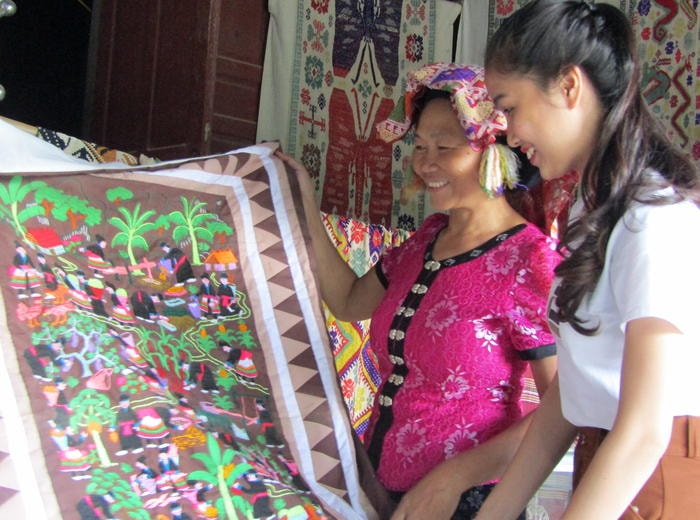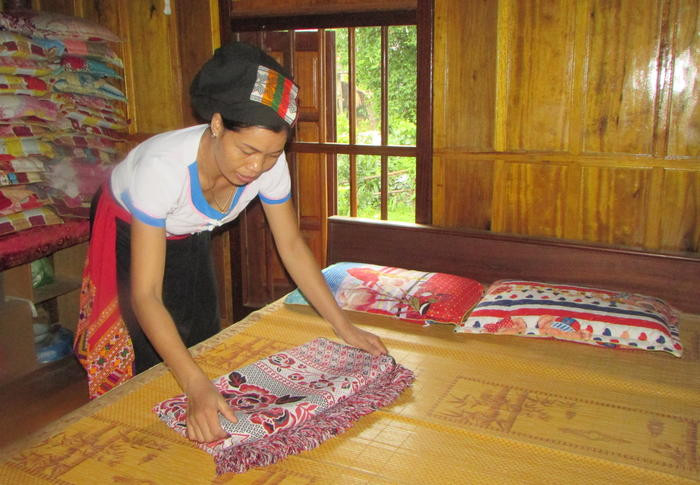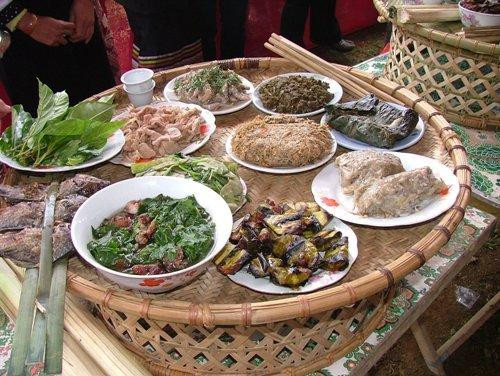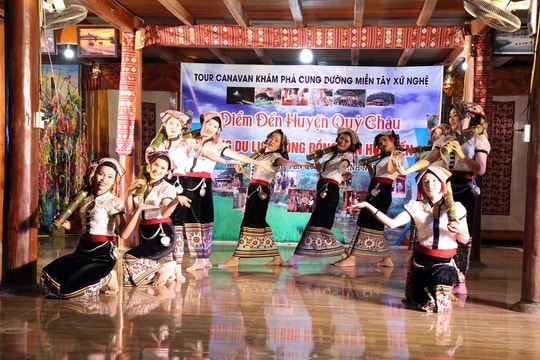Actively build new rural areas in villages
(Baonghean) - The policy of building new rural areas in villages is a close, correct and appropriate policy to gradually remove difficulties in building new rural areas, especially in mountainous districts of Nghe An.
Grassroots efforts
Hoa Tien 2 village, Chau Tien commune is one of the 5 villages that have reached the NTM finish line in Quy Chau. To achieve this result, right from the beginning of the year, after registering to reach the finish line, Hoa Tien 2 village established a Steering Committee at the hamlet and village levels, handing over targets and plans suitable to the specific conditions to each mass organization of the village.
 |
| Products from Hoa Tien 2 brocade village, Chau Tien commune (Quy Chau) are popular with many customers. Photo: Be Vinh |
As a mountainous village still facing many difficulties, the poverty criterion is considered the most difficult criterion for the village to achieve. In early 2017, Hoa Tien village still had over 20% poor households, but by the end of the year, according to statistics, the poverty rate had decreased to 11.8%.
Sharing this experience, Mr. Vi Van Hao - Head of Hoa Tien 2 village said: To achieve the poverty rate criteria, Hoa Tien Village Management Board has used the strengths of the locality to encourage production such as: Converting ineffective rice-growing land to sugarcane cultivation which has an economic value 6-7 times higher than rice cultivation. In addition, relying on traditional occupations, women are encouraged to embroider and weave brocade products during their free time to supply to Hoa Tien Brocade Cooperative...
Currently, the district People's Committee prioritizes the construction of community tourism villages, which has also created opportunities for the village to have more income and improve their lives. The establishment of criteria for poor households has also led to an increase in the criteria for workers with regular jobs. Currently, the whole village has 462 people of working age, of which 445 workers have regular jobs.
Mr. Hao also excitedly said: Previously, the village and hamlet roads were not concreted, so traveling was difficult. But with the cement support of the Provincial People's Committee, more than 4km of inner-village roads and 1.2km of village roads with inter-commune roads to Chau Binh commune were also built cleanly. Besides building the above criteria, the Village and Hamlet Management Board also focused on synchronously building 15 criteria and completed the NTM target in 2017.
 |
| Ms. Lo Thi Hoa, Nua village, Yen Khe commune (Con Cuong) prepares to welcome guests staying at her house. Photo: Pham Hau |
As for Nua village, Yen Khe commune, Con Cuong district, to increase income for households, the district and commune have encouraged and created all conditions for women to develop community tourism.
With 125 households, mainly Thai people, the people of Nua village have actively learned to have professional tourism methods, introduce the traditional beauty of their ethnic group and increase their income. The focus on tourism development in Nua village has helped people gradually escape poverty, striving to successfully build new rural areas.
Talking about the first days of starting a new career, Ms. Vi Thi Hoa, a member of the Women's Union of the village, shared: "At first, my sisters and I were very worried because everyone knew that doing tourism would be much more difficult than farming. Later, we were guided on how to communicate, introduce and promote the unique cultural features that we already have, so we confidently participated in tourism."
Mr. Vi Van Lam, Head of Nua village, said that since doing tourism, people's awareness has changed a lot. Village roads, alleys, and the environment are always kept clean and beautiful. In addition, the villagers in Nua village are also supported by village officials in conjunction with the commune's organizations, once a month to organize propaganda for them to understand the new rural construction model. Identifying community tourism as a way to build new rural areas, contributing to improving their material and spiritual living standards, every villager actively participates, from spreading and learning how to embroider scarves, weave fabrics, to performing Thai folk songs; actively collecting to introduce and promote unique ethnic cultural features...
There are still many difficulties.
In the period of 2017 - 2020, Quy Chau district has 14 communes registered to finish. However, by the end of November 2017, only 5 communes were assessed and recognized to have completed 15/15 criteria set by the Provincial People's Committee.
According to Mr. Nguyen Hai Ly - Deputy Chief of the Office of New Rural Development, Head of the Department of Agriculture and Rural Development of Quy Chau, the reason why 9/15 villages in Quy Chau have registered but failed to reach the target as planned is because: Villages and hamlets in the district still face many difficulties, with a low starting point. Among them, there are difficult criteria to achieve, such as criterion No. 7 on poor households, criterion No. 6 on income, criterion No. 5 on housing... With these criteria, the Office of New Rural Development together with the authorities of the communes and the Village Management Boards organized many meetings, proposing solutions to overcome difficulties according to the roadmap.
 |
| Building Hoa Tien 2 Community Tourism attracts tourists with special dishes of the Thai ethnic group. Photo: Be Vinh |
Quy Chau has also integrated many programs for construction. In 2017, implementing Program 135, Quy Chau district arranged investment in infrastructure construction, production support projects, and projects to support capacity building for community and grassroots officials.
Regarding infrastructure investment in 2017, the district allocated funds to repay debts for 38 projects with more than 2.6 billion VND, and invested in building 20 new projects with a total approved investment of more than 10.9 billion VND. The production development support project with a total implementation cost of nearly 4.7 billion VND was assigned to the District Mountainous Rural Development Board as the unit assigned to implement the Local Goat Breeding project and the Local Heifer Breeding project with 240 households benefiting.
Up to now, the whole province has 25 villages and hamlets meeting the new rural standards. Mr. Nguyen Van Hang - Deputy Head of the Provincial New Rural Coordination Office said: With the number of villages and hamlets meeting the new rural standards in the past 2 years, it is faster than the plan set by the Provincial People's Committee to have 50 villages and hamlets meeting the new rural standards by 2020.
That said, the highland people have realized that building a new rural area is for them and they themselves directly benefit. However, in order for the movement to build a new rural area in villages to become more widespread, in addition to doing a good job of propaganda work by local levels and sectors, the Provincial People's Committee and localities need to have specific policies and mechanisms to support villages and hamlets that register to reach the finish line every year because the remaining villages and hamlets have many shortages in their lives, leading to difficulties in mobilizing people to build new rural areas.
PV Group


